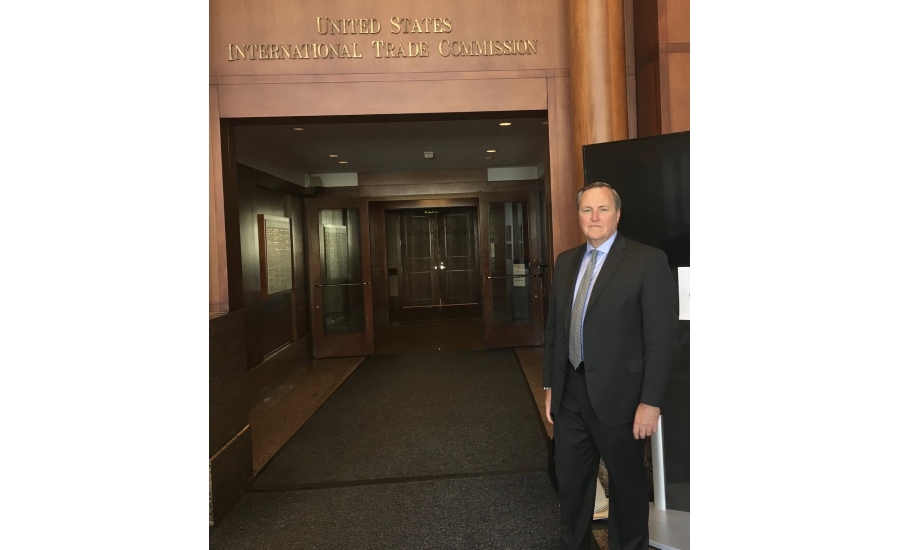WASHINGTON, Aug. 27, 2018 — Last week, the Office of the U.S. Trade Representative in Washington, D.C., began holding hearings on the most recent proposed Section 301 tariffs, which would place tariffs of up to 25% on $200 billion worth of products imported from China — including virtually all plumbing-related products and components.
If implemented as proposed, industry leaders say the tariffs will have disastrous consequences for American plumbing manufacturers, their employees and American consumers.
PMI SPEAKS OUT
As part of the regulatory process, the USTR hearings give interested parties the chance to make formal comments on the tariffs. Last week, Plumbing Manufacturers International CEO and Executive Director Kerry Stackpole testified in front of the USTR on the impact the tariffs would have on U.S. plumbing manufacturers, the economy and consumers.
“List 3 basically covers almost everything that's imported from China,” Stackpole said in an interview with Plumbing & Mechanical. “List 1 and List 2 had products that certainly impacted different industries at different times, but most of those lists did not include plumbing-related products. Now, the third list does include plumbing products — pipes, valves, fittings, and pretty much everything you or I might be interested in during a renovation or buying a home.”
In fact, the breadth of the products covered by List 3 is so extensive, it’s 205 pages long.
“If it weren't so serious, I'd made a joke and say it's everything including the kitchen sink,” Stackpole said.
But, it does include the kitchen sink, and it’s no laughing matter.
“All those products now are on this list, and frankly, at 25%, that has a huge impact on our manufacturers and the American economy,” he said. “The National Association of Homebuilders has said the tariffs on lumber have pushed the price of [new] homes up about $8,000, and these kinds of tariffs, at 25% and so forth, would certainly push up the cost of [plumbing] fixtures and fittings in a new home, which is not an ideal environment by any stretch of the imagination.”
Stackpole noted that placing tariffs on certain imported Chinese products isn’t inherently a problem, but taxing such a wide breadth of incoming goods at such a high percentage could have swift and detrimental effects on the U.S. economy.
“The items on this list originally were proposed at 10%, but that percentage has been escalated at the president's request to 25%,” Stackpole explained. “Part of what sparked a response and the engagement of so many is that the 25% number is significant — it's big enough that most manufacturers can't absorb it — they're not going to absorb it. They're going to have to pass it on.”
INDUSTRY BACKLASH
PMI is part of a coalition of more than 80 trade associates that all signed onto an Aug. 8 letter to USTR asking for reconsideration of the tariffs. The issue has gotten so much attention that as of the morning of Aug. 27, more than 2,000 official written comments had been submitted to the docket, including public comments from Homewerks Worldwide, General Tools & Instruments, Zurn Industries, Moen, Symmons Industries, Duravit, Tompkins Industries, US Valve, the American Lighting Association, the American Petroleum Institute (API) and more.
“Moen just wants access to the components our 2,500 employees need to build high-quality faucets here in the U.S.,” Moen Senior Vice President of Global Operations Jeff Swartz commented. “Moen is in full support of President Trump’s efforts to ensure fair competition. Moen faces foreign competition itself and wants a level playing field, but imposing yet more duties on Moen’s components materials will tilt the playing field in favor of its overseas competitors, with no benefits.”
“The Proposed Section 301 Action would impose additional duties on about 400 parts that General Tools & Instruments imports into the U.S. from China,” General Tools & Instruments President and CEO Ralph Mallozzi commented. “[I]mposing additional duties on the Subject Products would cause disproportionate economic harm to U.S. interests, including small- and medium-sized business and consumers.”
“Drain products are a linchpin product for the construction industry,” Zurn Industries General Manager Scott Burnett commented. “While they represent a relatively minor cost in an overall project, drains must be installed at specific times for the project to continue or be completed. Imposing a tariff on these components will reduce our inventory and introduce delays into the supply chain that will ripple through the construction sector. The negative effects will impact not only Zurn but also the overall timetable for the projects and, thus, countless downstream workers.”
“The Proposed Section 301 action would impose additional duties on valves, including medical ball valves and other items that US Valve imports into the U.S. from China,” US Valve President and CEO Stephen Lovell commented. “[I]mposing additional duties on the Subject Products would not be practicable or effective to eliminate China’s acts, policies and practices.”
“More than 434,000 American workers, including myself, rely on the plumbing fixture and fittings manufacturing industry including retailers, wholesalers, and commercial and home builders,” Duravit USA President Timothy Schroeder commented. “Imports of plumbing fixtures, faucets, sanitary ware and related parts do not threaten American security. The imposition of tariffs is a risk to our economic security, harms our company, jeopardizes jobs and investments in the U.S., and could lead to retaliatory tariffs.”
Meanwhile, other plumbing manufacturers are taking a wait-and-see approach to the proposed tariffs.
“[The tariffs] have a significant impact on the U.S. market,” Jomar Valve President and CEO Paul Craig told Plumbing & Mechanical. “We’ll see, but generally speaking, we had a great 2017, and we're expecting the same in 2018. In 2019, we'll see what happens, but we're optimistic for the next three to five years.”
NEXT STEPS
Hearings are ongoing through at least today, and formal written post-hearing rebuttal comments are due Sept. 6. In the meantime, PMI and others continue to urge the USTR and Trump administration to reconsider the tariffs.
“I suppose in the best of all worlds, zero tariffs would be a great place to be, but it looks like we're going to have to chart a path to get there, and that's what we're really encouraging the administration to do,” Stackpole said. “We think we'd be better off if we could get back to the bargaining table and do whatever it takes to get back to the bargaining table at the very least to start these conversations. I'm not saying surrender any of our positions — I'm really saying let's get focused on getting back to the bargaining table as opposed to moving forward with these kinds of broad-based tariffs.”
For more information or to comment, visit bit.ly/Sec301comments.



